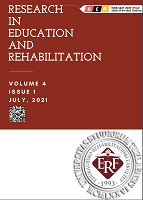PERCEPTIVE-MOTOR SKILLS IN CHILDREN WITH DEVELOPMENTAL DISABILITIES
PERCEPTIVE-MOTOR SKILLS IN CHILDREN WITH DEVELOPMENTAL DISABILITIES
Author(s): Adelisa Salkić, Milena NikolićSubject(s): Education, Health and medicine and law, Inclusive Education / Inclusion
Published by: Edukacijsko-rehabilitacijski fakultet Univerziteta u Tuzli
Keywords: visual-motor integration; fine and gross motor skills; developmental difficulties;
Summary/Abstract: Perceptual-motor skills (PMS) are very important for the functioning of children in general, including children with developmental disabilities, and enable a person to, based on the stimulus through movement it acts on the space that is surrounded. This paper aims to review the research of enriched knowledge of PMS of children with disabilities, which emphasized the importance of performing activities of everyday life and the acquisition of academic skills. The papers collected a search of electronic databases using the keywords: PMS, children with disabilities, visual perception, gross and fine motor skills, visual-motor coordination, visual-motor integration. Criteria for the selection of papers have been published in full and in the last 10 years. A total of 12 works met the criteria. The results of the research review showed that children with disabilities have a limitation in PMS, and showed that PMS differ separately from the type and degree of difficulty, but differences also exist within the same category of children with disabilities. Implementation of education and rehabilitation programs improves PMS. The results showed that there is a correlation between PMS and activities of everyday life and a correlation between visual perceptions and the acquisition of reading skills. It is important to point out that PMS can be practiced and it is important to implement incentive programs for children with disabilities, but also children at risk for some difficulty, to prevent possible difficulties that children may have in performing daily life activities and in acquiring academic skills. The results of the presented research should be considered concerning the limitations of the presented research, but also to the limitations of this research.
Journal: Research in Education and Rehabilitation
- Issue Year: 4/2021
- Issue No: 1
- Page Range: 27-42
- Page Count: 16
- Language: English

